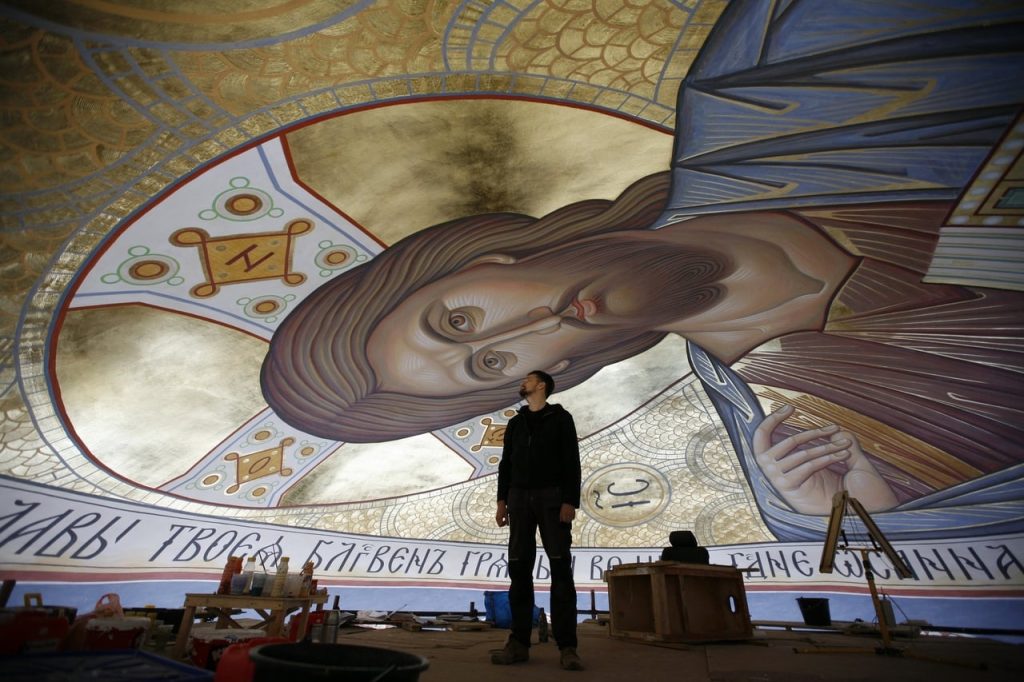
by Fr. Jonathan Cholcher
“But the fruit of the Spirit is love, joy, peace, longsuffering, kindness, goodness, faithfulness, gentleness, self-control. Against such there is no law” (Gal. 5:22-23). This particular word translated “self-control” (Gk., enkrateia) literally means to be “in-control” of oneself, the opposite being out-of-control. As a fruit of the Holy Spirit, self-control exhibits a godly way of life in control of the will of God, the opposite of which is “to fulfill the lust of the flesh” (Gal. 5:16).
What does an out-of-control life look like, that is, given over to the lusts of the flesh? “Now the works of the flesh are evident, which are: adultery, fornication, uncleanness, lewdness, idolatry, sorcery, hatred, contentions, jealousies, outbursts of wrath, selfish ambitions, dissensions, heresies, envy, murders, drunkenness, revelries, and the like…those who practice such things will not inherit the kingdom of God” (Gal. 5:19-21).
Thus self-control manifests the opposite of these vices, namely, the virtues: chastity, continence, purity, dignity, reverence, prayer, love, harmony, deference, calmness, modesty, unity, truthfulness, contentedness, helpfulness, sobriety, moderation, and the like. Notice that most, if not all, of these virtues pertain to keeping our bodies in control. Self-control pertains especially to subjecting our flesh to the Spirit. Self-control is the exercise of our own fleshly will in conformity, or cooperation, with the will of God bringing our entire person, body and soul, under control of God’s holy and eternal divine plan for our lives.
The Apostle Paul describes this ascetic struggle of self-control. “Do you not know that those who run in a race all run, but one receives the prize? Run in such a way that you may obtain it. And everyone who competes for the prize is temperate (Gk., enkratevetai; “in control”) in all things. Now they do it to obtain a perishable crown, but we for an imperishable crown. Therefore I run thus: not with uncertainty. Thus I fight: not as one who beats the air. But I discipline my body and bring it into subjection, lest, when I have preached to others, I myself should become disqualified” (1 Cor. 9:24-27).
The practice of self-control is ascetical (from the Gk., askesis), that is, precisely like athletic training. “Running a race…competing…fighting…disciplining the body,” these activities all describe the Spirit-produced Christian fruit of self-control. And like athletic training, the practice of self-control necessarily involves the effort of forcing ourselves to do what is difficult and painful (see Matt. 11:12), contrary to our impulses and desires accustomed to sin seeking ease and pleasure. Yet without such effort we do not make the will of God our own, we will not grow in the grace of God, and we will not attain the ultimate prize of the race.
And what is the prize? “[T]hat I may lay hold of that for which Christ Jesus has also laid hold of me…I press toward the goal for the prize of the upward call of God in Christ…For our citizenship is in heaven, from which we also eagerly wait for the Savior, the Lord Jesus Christ, who will transform our lowly body that it may be conformed to His glorious body, according to the working by which He is able even to subdue all things to Himself” (Phil. 3:12,14, 20-21). The prize is eternal communion with God accomplished in the Crucifixion, Resurrection, and Ascension of Jesus Christ the God-Man.
Self-control is the practical demonstration of redemption in Christ. Our Lord said, “Whoever desires to come after Me, let him deny himself, and take up his cross, and follow Me. For whoever desires to save his life will lose it, but whoever loses his life for My sake and the gospel’s will save it” (Mk. 8:34-35). Commenting on the conditions of expelling demons, Jesus said, “This kind can come out by nothing but prayer and fasting” (Mk. 9:29). Regarding salvation in these end times, Christ teaches: “But take heed to yourselves, lest your hearts be weighed down with carousing, drunkenness, and cares of this life, and that Day come on you unexpectedly…Watch therefore, and pray always that you may be counted worthy to escape all these things that will come to pass, and to stand before the Son of Man” (Lk. 21:34, 36).
Ultimately, self-control consists of devotion to keeping the commandments of God because this is the original will of God. In this regard, self-control expresses God’s original purpose of creating mankind in His image and likeness. Created in God’s image, mankind is not complete without becoming more and more like God according to His design and direction, and this direction, especially for us who have misused God’s design (misuse is otherwise known as sin), is found in God’s commandments.
In Orthodox vocabulary, the image of God is described as the faculty of self-determination (Gk., autexousia) and freedom of choice. God does not compel us to be who we are created to be; rather, God gives us the ability to choose the divine life by freely keeping His ways in obedience to His commands. This was the original condition of man when given the command not to eat of the tree of the knowledge of good and evil (see Gen. 2:16-17).
After the disobedience of Adam and Eve and the fall into sin, God sent His only-begotten Son in the flesh to restore what was fallen. Christ Jesus is “the image of the invisible God, the firstborn over all creation” (Col. 1:15). “What the law could not do in that it was weak through the flesh, God did by sending His own Son in the likeness of sinful flesh on account of sin: He condemned sin in the flesh, that the righteous requirement of the law might be fulfilled in us who do not walk according to the flesh but according to the Spirit” (Rom. 8:3-4). “But as many as received [the Word, the Son of God], to them He gave the right (Gk., exousia) to become children of God, to those who believe in His name: who were born, not of blood, nor of the will of the flesh, nor of the will of man, but of God” (Jn. 1:12-13).
Therefore, for Christians, “[I]t is no longer I who live, but Christ lives in me” (Gal. 2:20). The authentic life restored in Christ consists of keeping the commandments: “If you love Me, keep My commandments…He who has My commandments and keeps them, it is he who loves Me. And he who loves Me will be loved by My Father, and I will love him and manifest Myself to him…If anyone loves Me, he will keep My word; and My Father will love him, and We will come to him and make Our home with him” (Jn. 14:15, 21, 23).
The practice of self-control manifests the incorruptible life of Christ Jesus in the person truly seeking salvation with God. Fasting, prayer, works of mercy, love of family, neighbor, and enemy alike, humility, vigilance, quietness, peacefulness, zeal for the Gospel, courageous calmness in the face of evil, suffering in hope – these are all virtues exhibited by Christ Himself (see Heb. 5:7-9). They are all virtues sought and practiced in the lives of the faithful energized by the Holy Spirit of Christ.
Self-control shows the proper exercise of the freedom we have, not to be autonomous or independent in our self-will in conformity to a world corrupted by sin and death moving away from God’s purposes (that is, out-of-control). Self-control puts true freedom into action showing forth the true goal of our existence, the service and worship of the holy God in the proper use of both body and soul.
